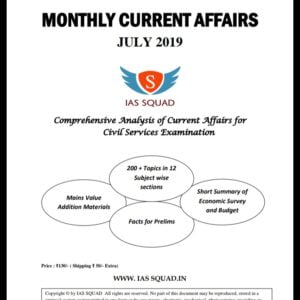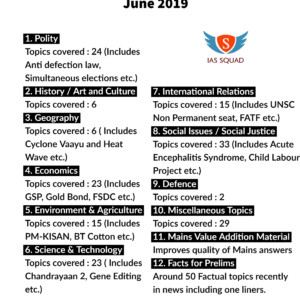PIB Analysis for UPSC CSE
Topics Covered
- Dr Sarvepalli Radhakrishnan
- EX TSENTR 2019
- Mobile Science Exhibition Programme
- Eat Right Stay Fit
- Indo–Thai CORPAT
- Facts for Prelims : Centralized Technology Vertical, Kaushalacharya Awards
1 . Dr Sarvepalli Radhakrishnan
Context : Each year on September 5, we celebrate the birth anniversary of Dr. Sarvepalli Radhakrishnan as Teacher’s Day. He was a great teacher and India’s second President.
About Dr Sarvepalli Radhakrishnan
- As an academic, philosopher, and statesman he was one of the most recognized and influential thinkers in academic circles in the 20st century
- From 1931 to 1936, he was Vice-Chancellor of Andhra Pradesh university. In 1936, he taught eastern religions and ethics at Oxford university.
- He was the first Indian to be appointed the Vice Chancellor of Banaras Hindu university. In 1938, he was elected as a fellow of the British academy.
- In 1947, he represented India at UNESCO.
- In 1949, Dr. Radhakrishnan was appointed ambassador to the Soviet Union.
- Radhakrishnan was elected the first Vice President of India in 1952 and served two terms
- He was the First Vice President of India and served for two terms
- He was the Second President of India ( 1962-67)
- His birth anniversary is celebrated as Teachers Day
- He received Bharat Ratna in 1954
2 . EX TSENTR 2019
About Ex TSENTR 2019
- Exercise TSENTR 2019 is part of the annual series of large scale exercises that form part of the Russian Armed Forces’ annual training cycle.
- The series rotates through the four main Russian operational strategic commands.
- Russia holds a major military exercise every year at one of it’s four military Commands i.e Vostok (East), Zapad (West), TSENTR (Centre) and Kavkas (South).
- This year the exercise is planned between 09 September to 23 September 19 at Donguz training ranges, Orenburg, Russia.
- These annual exercises have slowly began taking an international character, with Belarus participating in ZAPAD-2017 and China and Mongolia participating in VOSTOK-2018.
- This year, invitations for participation have been extended to nine other countries. Apart from host Russia, military contingents from China, India, Kazakhstan, Kyrgyzstan, Tajikistan, Pakistan and Uzbekistan will also take part in this mega event.
- The exercise aims at evolving drills of the participating armies and practicing them in the fight against the scourge of international terrorism thereby ensuring military security in the strategic central Asian region. The TSENTR-2019 strategic measures will focus on evaluating the level of troop preparedness, the acquisition of the required skills and raising the level of inter- operability and demonstrate the readiness of the participating armies.
- The exercise TSENTR 2019 will comprise two modules. The first module will include counter- terror operations, repelling air strikes, reconnaissance operations and defensive measures, while the second will focus on offensive operations.
3 . Mobile Science Exhibition Programme
Context : The Union Culture Minister simultaneously launched 25 new Mobile Science Exhibition buses for Aspirational Districts of India.
About the News
- The Minister further stated that the Government of India aims to upgrade the districts which have shown relatively less progress in achieving key social outcomes through a mass movement.
- This will help to quickly and effectively transform these districts named as ‘Aspirational Districts’. He also informed that to fulfil this objective, NCSM, an autonomous S&T institution under the Ministry of Culture jointly with the Department of Science &Technology (DST), Government of India is launching 25 new Mobile Science Exhibition Buses specifically for these aspirational districts.
- The buses will travel to schools in Aspirational Districts through out the year except during the vacations and will aim to create a scientific awareness among the rural children. Each specially designed bus contains 20 interactive exhibits and other demonstrations related to children and rural life.
Aspirational Districts Programme
- The ‘Transformation of Aspirational Districts’ Programme aims to expeditiously improve the socio-economic status of 117 districts from across 28 states.
- The three core principles of the programme are – Convergence (of Central & State Schemes), Collaboration (among citizens and functionaries of Central & State Governments including district teams), and Competition among districts.
- Driven primarily by the States, this initiative focuses on the strengths of each district, and prioritizes the attainable outcomes for immediate improvement
- The programme focusses on 5 main themes – Health & Nutrition, Education, Agriculture & Water Resources, Financial Inclusion & Skill Development, and Basic Infrastructure, which have direct bearing on the quality of life and economic productivity of citizens.
What is a Mobile Science Exhibition (MSE) Programme?
- First MSE on the theme ‘Our Familiar Electricity’ was inaugurated at Ramakrishna Mission Boys’ School, Narendrapur, near Kolkata on 17th November 1965. The first MSE Bus was flagged off in 1966 from Birla Industrial and Technological Museum, Kolkata.
- Mounted on a specially designed bus, a Mobile Science Exhibition carries a number of interactive exhibits related to everyday science.
- The MSE or Museo-bus travels from school to school in rural areas and organize exhibitions there throughout the year. Along with the exhibition, some other programmes like Sky Observation Programme through telescope, science films show, Science Demonstration Lectures etc. are also organised.
Why MSE Programme in Leh,Ladakh Region
The Science Explorer MSE programme in the Leh, Ladakh region will be the first of its kind in the region with a broad objective to:
- Popularize science and technology among the students and general public.
- Creating a scientific awareness in the society.
- Inculcating a spirit of enquiry among the young people.
- Inspiring youngsters to pursue a career in science, technology, engineering and mathematics.
- Supplementing formal education imparted in schools and colleges with non-formal science education.
- Promoting a culture of science in the society.
About National Council of Science Museums
- National Council of Science Museums (NCSM), an autonomous organization under the Ministry of Culture, Govt. of India is primarily engaged in ‘Communicating Science to Empower People’ through its network of twenty-five Science Centres/Museums spread across India.
- With the help of its unique interactive science exhibits through which students can explore the basics of science and technology, travelling and short-term exhibitions, Mobile Science Exhibitions (MSE) units and a wide range of science based educational programmes and activities for public and students in particular, NCSM has now become a trend setter in the field of science communication both at national and international level. NCSM is the world’s largest network of science centres and museums that functions under a single administrative umbrella.
4 . Eat Right Stay Fit
Eat Right Stay Fit
- Eat Right India Movement of FSSAI is the new healthy eating approach which places citizens at the centre of a Health Revolution through food and fitness.
- The campaign ‘Eat Right India’ with its new logo and tagline ‘Sahi Bhojan. Behtar Jeevan’ were released by the Health Minister
- Campaign along with the ‘Fit India’ Movement’ launched by the Prime Minister will help to fight lifestyle diseases like hypertension, obesity and diabetes effectively
Govt Initiatives
- Month of September is being celebrated all across the country as “Poshan Maah” (Nutrition Month) to sensitize the public towards healthy eating, address the twin issues of malnutrition/undernutrition and problem of obesity in some sections of the population, and also intensifying the campaign towards a ‘Malnutrition-Free India
- Government has prescribed a limit for Total Polar Compounds (TPC) at 25% in cooking oil to avoid the harmful effects of reused cooking oil.
- Standards for five fortified staples -wheat flour, rice, oil, milk and salt to reduce large-scale deficiencies of vitamins and minerals have been notified, in addition to standards for health supplements, nutraceuticals, prebiotics and probiotics products.
- To facilitate informed consumer choices Regulations on Advertising and Claims and mandatory menu labeling has been notified. In addition, labeling provisions have been made for appropriate use of sweeteners for children and pregnant women”
- To reach the target of Trans-fat Free India by 2022, regulations to reduce trans-fat to less than 2% in all oils, fats and food products are in place.
5 . Indo–Thai CORPAT
About Indo-Thai CORPAT
- India-Thailand Coordinated Patrol (Indo-Thai CORPAT) between the Indian Navy (IN) and the Royal Thai Navy (RTN) is being conducted from 05 – 15 September 2019.
- Indian Naval (IN) Ship Kesari and His Majesty’s Thailand Ship (HTMS) Kraburi along with Maritime Patrol Aircraft from both the navies are participating in the CORPAT.
- The 28th cycle of Indo-Thai CORPAT is poised to further enhance strong bilateral ties and maritime cooperation between India and Thailand. The CORPAT is truly reflective of the strong desire for a peaceful Indian Ocean safeguarded through good maritime order in the region
6 . Facts for Prelims
Centralised Technology Vertical
- Centralised Technology Vertical (CTV) will be set up within CBI,
- It will help in getting real time information for the benefit of interrogators,
National Artificial Insemination Programme
- The main benefit of using sex-sorted semen is that the farmer can ensure that only female calves or heifers are born.
- Artificially inseminating cows using semen from genetically superior bulls would also improve the fertility and milk production capacity of the calves they produce, thus incentivising farmers to keep them longer rather than abandoning them
- Artificial insemination can triple milk production rates, especially for the vast majority of non-descript indigenous cows, and improve the overall quality of the cattle.
- Using sex-sorted semen — which increases the possibility of a female calf to about 90% — also drastically increases the cost of insemination, as the technology is still new in India.
National Animal Disease Control Programme for Foot and Mouth Disease and Brucellosis
- National Animal Disease Control Programme for Foot and Mouth Disease and Brucellosis is a 100% centrally funded programme, with a total outlay of Rs.12,652 crore from 2019 to 2024.
- It aims to control Foot and Mouth Disease and Brucellosis by 2025 with vaccination and eventual eradication by 2030.
Kaushalacharya Awards
- Kaushalacharya Awards would be an annual event to recognize the contribution made by skill trainers in the vocational training ecosystem.

